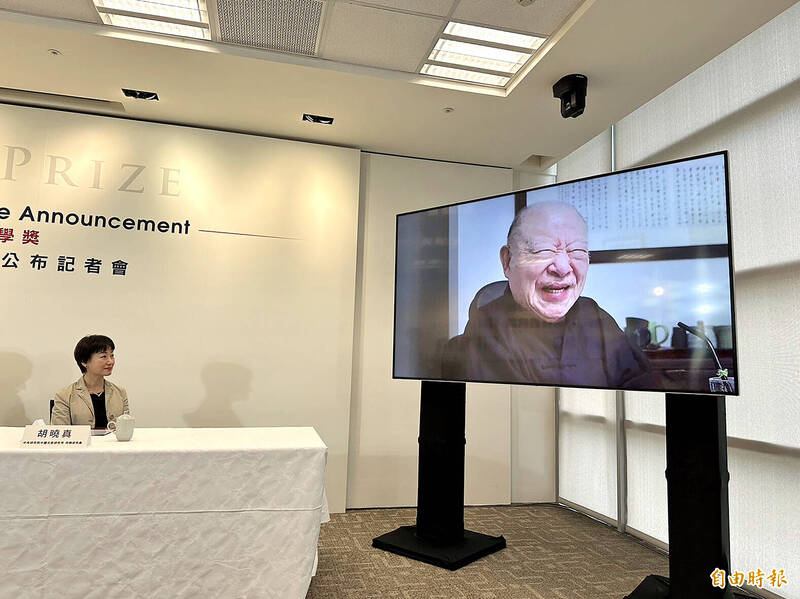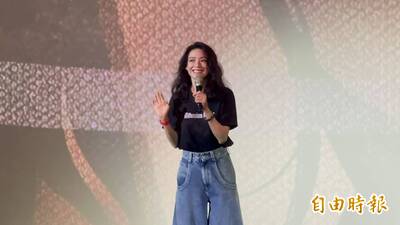《TAIPEI TIMES》 Hsu Cho-yun awarded Tang Prize in Sinology

Taiwanese-American historian Hsu Cho-yun, right, speaks via video at a ceremony awarding him the Tang Prize for Sinology in Taipei yesterday. Photo: Yang Yuan-ting, Taipei Times
/ Staff writer, with CNA
Hsu Cho-yun (許倬雲), a 94-year-old Taiwanese-American historian who specializes in ancient China, has been named this year’s Tang Prize winner in Sinology for his integration of social science methodologies into historical research and his devotion to comprehensive historical narratives.
Hsu was chosen for his “holistic approach to the study of Chinese history; his engagement with the cultural and intellectual exchanges between China and the world; and his capacity to broach contemporary issues from the perspective of antiquity,” Tang Prize Selection Committee for Sinology chairman Wang De-wei (王德威) said in a video at a news conference in Taipei yesterday.
“With his erudition and public spirit, professor Hsu best exemplifies a Sinologist’s historical sensibility and worldly vision,” said Wang, a Harvard professor who is also a Chinese literature expert and an academic at Academia Sinica.
In a prerecorded response, Hsu said he was fortunate to be awarded the prize, and expressed hope that the Tang Prize would serve as an inspiration to other academics.
“I consider myself extremely fortunate to win the Tang Prize, as I can think of maybe 10 to 20 scholars of different ages at the same academic level as myself,” Hsu said. “I hope that knowing it is possible to receive recognition in one’s chosen field, even at the age of 94, will inspire more scholars from the younger generation as well as those in their prime.”
Born in 1930 in Xiamen, China, Hsu and his family moved to Taiwan in 1948, one year before the end of the Chinese Civil War. He received undergraduate and graduate degrees from National Taiwan University’s (NTU) Department of History before earning a doctorate from the University of Chicago.
Hsu held academic positions at Academia Sinica from 1956 to 1971 before moving to the US in 1970 to teach at the University of Pittsburgh in Pennsylvania.
He taught history and sociology at the University of Pittsburgh for 30 years.
The Tang Prize Foundation said that Hsu specializes in topics related to the Zhou, Qin and Han periods, providing unique insights that contribute to a comprehensive interpretation of early Chinese history.
Notable examples include his exploration of Huaxia consciousness among kinship groups in Western Zhou Civilization; the central-local and political-social bureaucratic systems in his work Qiugu Bian (求古編), or Discovering Antiquity; and the intensive rural/commercial market economy in Han Agriculture.
These works form what he calls “the three matrixes of Chinese culture,” in other words its foundations.
Beyond his academic contributions, Hsu has led new trends in historical research, influencing Taiwanese historiography for three decades, the foundation said.
After the 1980s, many of his students emerged as renowned historians, it said.
Hsu’s historical perspectives have been widely disseminated through lectures and publications in China since the 1990s, and had a significant impact on academia and society worldwide, it said.
Hsu has transformed historical research into a resource for humanistic education, publishing numerous works on general themes from epochal transitions, to leadership, organizational systems, the rise and fall of great powers, knowledge and democracy, the foundation said.
It said Hsu is a “model figure demonstrating both Western academic rigor and traditional Chinese intellectual engagement.”
In an interview, Hsu said he is grateful to still receive such high recognition in his 90s and hopes to serve as an inspiration for others in the field.
“At 94, it is about time for me to hand in my exam paper to society and hopefully society will tell me I passed the exam,” the nonagenarian said. “But at the same time, I don’t consider myself passing the test and I will continue to learn until I take my last breath.”
Recalling the days when he first arrived in Taiwan with his family, Hsu said that even though most Taiwanese were poor, people were kind enough to support him and his family.
“For that I am forever grateful for Taiwan and see it as my second home,” he said.
Hsu even in his retirement publishes books covering different topics and writes columns for Taiwanese newspapers.
Over the past five years, he has also taken to social media to share his views on life and Chinese history, and now has more than 1 million followers in China.
As a seasoned expert on Chinese history, he hopes that ultimately both sides of the Taiwan Strait would achieve peace, Hsu said.
“I wish one day that brothers from both sides of the Strait can shake hands and no longer see each other as enemies,” Hsu said.
The Tang Prize is a biennial award established in 2012 by Taiwanese entrepreneur Samuel Yin (尹衍樑), chairman of the Ruentex Group (潤泰集團), to honor people who have made prominent contributions in four categories: sustainable development, biopharmaceutical science, Sinology and rule of law.
A cash prize of NT$40 million (US$1.24 million) and an additional NT$10 million in research funding are allocated to each award category.
“History is at the crossroads of all other studies and is the basis for their development,” Academia Sinica member and former minister of education Tu Cheng-sheng (杜正勝) quoted Hsu as saying in a speech at NTU when Tu studied there.
It is evident that Hsu was optimistic about his subject of study, Tu said at the event.
While Hsu is known to sympathize with China, Tu said that this personal emotion does not carry over to his research.
Hsu did not “box himself in” studying only ancient Chinese history, Tu said, adding that he conducts his research with an Asian framework, then contrasts the content based on Asian and Western perspectives.
Additional reporting by Yang Yuan-ting
新聞來源:TAIPEI TIMES




















